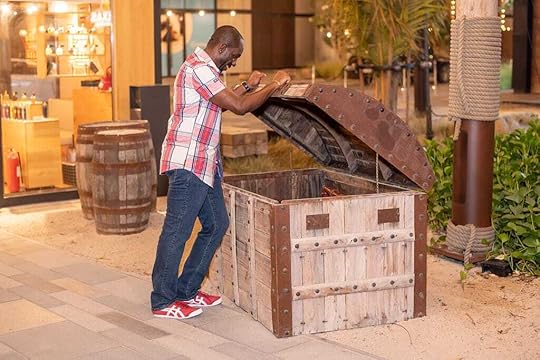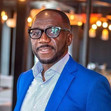Dunstan Ayodele Stober's Blog
July 21, 2024
A Mentor’s Maxims for a Great Life
“ A generous person will prosper; whoever refreshes others will be refreshed.” — Prov 11:25

I have a dream!
I dream of creating a company that will make a difference and share its success with those who help create it. That would be a great company.
Since I started the project about five years ago, we have encountered challenges, setbacks and costly lessons. With my entrepreneurial hat on, I sought to find people driven not by money but by the legacy we would create together.
In researching how great companies are built, I found Jim Collins and Bill Lazier’s BE 2.0, a comprehensive guide to building enduring companies.
Jim Collins’ tribute to his late mentor, Bill Lazier, “Life Lessons from a Magnificent Mentor,” profoundly resonated with me.
According to Jim, Bill Lazier built companies that “created jobs and generated wealth long after his own life expired.”
Below, I paraphrase the six lessons that would benefit anyone looking to do something to create and leave a legacy.
1. Give freely to others
Money, time or service, always answer the call to help others. Jim stated that he and Bill followed William R. Hewlett’s motto, “Never stifle a generous impulse.”
2. Fully commit at the crucial moment
Burn the boats!
Bill, like me, was a CPA at an accounting firm. He traded the opportunity of partnership for entrepreneurship. I don’t know if I would have done that, but I believe Bill’s saying, “If at the critical moment, you don’t go all in, the odds of achieving the dream go from low to zero.”
3. Choose trust over distrust
We have all had our trust abused by someone at some point. But, Bill chose to “assume the best in people and accept that they sometimes disappoint because people rise to what you believe of them.”
4. Build great relationships
“You can go at life as a series of transactions, or you can go at life building relationships. Transactions can give you success, but only relationships make for a great life.” – Bill Lazier. A great relationship is one in which both parties believe they benefit more than they give in the relationship.
5. Values before everything
No matter how inconvenient, costly, or demanding, always start with values because, according to Bill, “Success shouldn’t be primarily about what you do but about who you are, and if you define success by money, you always lose.
6. Have fun
When Jim struggled to finish Beyond Entrepreneurship’s original edition, Bill encouraged him, “Life is too short not to enjoy what you’re doing. If we can’t make this fun, we should stop doing it.”
If, through your business, career or life in general, the people you touched can say their lives “are different and better because of you, you would have succeeded in doing something great.
Let’s make this week a great week — giving to others, choosing trust over distrust, nurturing great relationships, staying true to our values and having fun doing what we do.
[image error]July 8, 2024
How to be Confident in Decision-Making
“ I will instruct you and teach you in the way you should go; I will counsel you with my eye upon you.” — Prov 32:8
 At the beach: Deciding what to write
At the beach: Deciding what to writeDo you believe you make 35,000 decisions every day?
That is, according to many unconfirmed references on the Internet.
“Why do we find it so difficult to make decisions?”
From the mundane to the monumental, conscious or subconscious, our decisions are critical for the success of a company, group or individual.
Last year, my eldest daughter achieved excellent matriculation results, and six universities accepted her, two of which offered partial scholarships. However, her preferred Australian university responded late and was conditional acceptance without a scholarship.
She researched the university’s ranking and its fit for her specialisation, social safety, security, and immigration. How much it will cost Mum and Dad was not on the list.
There was no unanimous decision. Mum chose a university offering scholarships, and my daughter was set on being 10,321 km away from Johannesburg.
Dad, what do you decide?
I kissed my credit card and said, if you believe Australian university is the best at your chosen field and gives you the best chance of breaking into the industry, Melbourne it is.
Suffice it to say that I slept with imaginary earplugs that night.
After all the frustrations of delayed acceptance documents and postponed admissions, I spent the best week of my life with my daughter in Melbourne when I took her for her university orientation and helped her start her new life.
During a WhatsApp chat a few days ago, my daughter sent me this message:
“Thank you, Daddy, for providing and giving me this opportunity to do what I love and fulfil my purpose. I’m going to make you proud.”
Best decision I ever made? Absolutely!
I used Mikael Krogerus and Roman Tschappeler’s TEDx Talk, How to Make Good Decisions, May 2016, to outline what that experience taught me about decision-making that might help you.
1. Preparing. “Do I know enough?” Although we were confused by the many options, Sophia had the right amount of research information to help us decide.
2. Timing. “Is this the right time?” If we had decided early before having all the options or too late, Sophia would have missed her preferred university.
3. PDF (Post Decision Feeling). “Could there have been a better option?” After reading Sophia’s message, my emotions told me I made the right decision.
The decision-making process extends well after we choose our course of action. Our decision may not be wrong or right until we can evaluate the outcome. Hence, we do not make the right decisions; we act to make our decisions right.
“You can’t connect the dots looking forward; you can only connect them looking backwards. So you have to trust that the dots will somehow connect in your future.” — Steve Job.
Whether you’re deciding on a career move, starting a business, or going on a holiday, make sure you have the right amount of information, choose at the right time, and trust that the dots will connect.
Here is to a week full of great decisions.
[image error]May 19, 2024
Life Lesson from My 15-Year-Old Son
“For I know the plans I have for you, declares the Lord, plans for welfare and not for evil, to give you a future and a hope.” — Jer 29:11

Two days ago, on his 15th birthday, my son reminded me of an important life lesson. It is another proof that he is a boy beyond his years.
I could have applied this life lesson nine years ago when I was leaving Kabul, Afghanistan, after almost four years of helping one of the leading telecommunication deliver on its promise of giving Afghans the benefit of a modern connected life.
I could barely sleep the night before the day I was due to leave. I had said my emotional goodbyes and reflected on a four year tenure well spent. The next morning, we heard news of one of the very few attacks on the international airport. All flights were cancelled. My relief at leaving turned into anxiety about not knowing what would happen next.
Thankfully, the incident lasted only for a day without much damage, and flights resumed.
As I left Kabul, I told myself that I would never be back there because the chances of me applying for a job there were infinitesimal. Even by that tiny chance a job did come up, I would turn it down.
Four years later, I was called for my first CFO job, and I took it, and I was back in Kabul.
I am reflecting on these events now because of my son’s reaction to one of my friends’ comments on something I posted about him on his 15th birthday.
My son dreams of being a professional football/soccer player one day. He seems to be on the right path, showing signs of focus, dedication, and hard work. He has scored in the last five games for his current club in South Africa, which grabbed the attention of one social media pundit.
I shared the pundit’s Instagram post, which concluded, “He definitely has the potential to be a top striker one day.”
One of my closest friends responded to that post on my WhatsApp status: “Congratulations, young Stober. My wish is that you play for Liverpool one day.”
But David dreams of playing for one of the two teams he supports — Barcelona and Manchester City.
When I shared my friend’s comment, I expected David to say, “No way,” or something similar. Maybe that is because I also wish he would play for Arsenal one day. Stay with me, EPL followers. Do not drift off-topic.
David’s one-line response is a lesson I will borrow. And I believe you should do too.
After I told him who sent the comment, he replied, “Okay.” And then said:
“Anything could happen.”
I should have known that nine years ago when I was leaving Afghanistan.
Anything could happen. Anything is possible. In that sits three habits of winners:
1. Never take things for granted.
2. Always be open to possibilities.
3. Focus on being the best you can be in the present.
As we start a new week, remember that anything could happen. Let’s make this week a week of possibilities.
[image error]April 22, 2024
Leadership Values From Disney Movies
“And let us not grow weary of doing good, for in due season we will reap if we do not give up.” — Gal 6:9
 Photo by Skitterphoto from Pexels
Photo by Skitterphoto from PexelsUS$ 7,400,000,000. Yes, US$ 7.4 billion.
That is what Walt Disney paid for the Pixar Animation Studio in 2006.
I stumbled on this information while researching Steve Jobs to prepare a product launch talk I am working on. The staggering number derailed me from research to curiosity.
Who could have sanctioned the purchase of a company that makes cartoons for 10 digits in greenbacks? Is the cartoon movies business that lucrative?
Wait. I have seen Tangled, Aladdin, Brave, Mulan, Moana, Finding Nemo and Toy Story. Did I forget the Lion King?
No wonder we call them animation these days. Cartoons were for kids. I am sure you, too, would have a decent list of animation movies you have watched.
But does that justify Pixar’s price tag, especially since Disney has brought us some great movies of its own?
“Breaking News: The blockbuster Disney deal creating an entertainment giant. The mastermind behind the union, Disney CEO, Bob Iger” — Good Morning America Show.
Although Bob Iger was the President of Disney since 2000. Still, the deal was a bold move for someone who had been in the CEO seat for only five months.
If he was the mastermind behind this blockbuster deal, I have to learn from his masterclass.
After an hour and four minutes, Bob Iger clearly connected Disney’s corporate values to their movies in his introduction. His 45 years at the company, made him an authority on the subject.
Here is what I learnt from “one of the greatest companies in the world” that I believe will help you in your leadership and professional journey.
Walt Disney’s values are:
1. Respect for others. Toy Story — “to infinity and beyond.”
2. The value of hard work.
3. Good will ultimately triumph over evil. Star Wars, Captain America
4. The spirit of adventure. Finding Nemo
5. Taking risks.
6. Resilience, in the ability to pick yourself off and get back into the “fight” — Wakanda Forever
Bob Iger concluded his Masterclass introduction — “if you can achieve those things at a company, which I am proud to have at the Walt Disney Company, then success is a bonus.”
I share these six values this week because they have been critical to my professional and entrepreneurial journey. Resilience is the most important of the six.
“…success can be fantastic and exhilarating and feel great. But failure can be just around the corner. And you have to have the ability to absorb failure or manage failure, knowing at the beginning that nothing was a given, nothing was an absolute.” — Bob Iger
We will face challenges, fail sometimes, and experience self-doubt. To succeed, we must find the strength, will, and courage to pick ourselves up and keep going.
No matter what challenge you are facing this week, I hope you find the resilience to keep going.
April 15, 2024
How to Find Your Balance for Optimal Performance
“For I know the plans I have for you, declares the Lord, plans for welfare and not for evil, to give you a future and a hope.” — Jer 29:11

“Are you getting absorbed in one role to the disadvantage of the others?”
That is the question from my flashcard deck, “The 7 Habits of Highly Effective People.” The deck contains 52 cards to challenge and inspire, with one thought a week from each habit.
The topic for week 16 — “Balance Your Roles”, is a timely reminder to help me understand and overcome the difficulties I have been experiencing lately.
I have been overwhelmed by the lack of progress in some of the most important areas of my life, and I know I am not being hard on myself.
As an author, I am behind on my publishing targets. As an entrepreneur, I am not progressing as well as I planned. As a parent, being away from my family is taking a toll on me. Moreover, I have abandoned my self-care routine — no exercise, unhealthy eating habits, and poor sleep.
“One of the major problems that arises when people work to become more effective in life is they lose the sense of proportion, the balance. They may neglect the most precious relationships in their lives.” — Stephen R. Covey
I now realise that my lack of progress or fulfilment is due to the imbalance in my roles. I will do a self-audit to identify which role I spend disproportionate time and effort on.
Then, I will work actively on spacing myself, fairly apportioning my time to fulfil my important roles effectively and gain balance.
This week, join me in applying the steps I paraphrased from Stephen R. Covey’s flashcard.
1. Identifying our most important roles — entrepreneur, author, coach, professional, parent, husband, wife, etc.
2. Planning the week to help us do things that will help us better fulfil these roles.
As we start the 16th week of 2024, let us be mindful of achieving balance in our most important role.
[image error]April 1, 2024
Are You Content or Complacent?
“For the moment all discipline seems painful rather than pleasant, but later it yields the peaceful fruit of righteousness to those who have been trained by it.” — Heb 12:11

“I am afraid of change.”
The lady at the O R Tambo International Airport in Johannesburg said as she handed me my passport. I see you work for MTN. She started after inspecting my visa.
“Who will you be meeting? What is your meeting about?” Regular business meetings, I replied.
Will you be discussing the tariffs? The rates are too high; they must bring them down, she continued.
It is good that you are using MTN. I am sure you know we offer the best value for money.
“No, I am using a different provider.”
So, I encouraged her to change over to MTN.
“I don’t have any complaints with my service provider. I am struggling with affordability only.”
That is an excellent reason to try us.
“No, man. I have been using this line since I was in school. “I am struggling with affordability, but I will not change my service provider.”
“I am scared of change.”
As I walked away, I thought about how sometimes we find ourselves in the same situation — with our careers, businesses, and relationships.
We are unhappy with our current position but are too scared of trying the alternative. What if we fail? What if it does not work out?
We find comfort and complacency in the saying, attributed to an African proverb, “The devil you know is better than the angel you don’t know.”
But is that true?
I believe there is no growth or progress without change.
The beauty of the butterfly comes out of the change of the caterpillar.
Change is painful. Change is uncomfortable. But comfort does not breed success.
Growing a successful career, building a thriving business or cultivating meaningful and lasting relationships requires change.
“I am no longer accepting the things I cannot change. I am changing the things I cannot accept.” — Angela Davis
Whether you are contemplating changing a service provider or thinking about a major career or business move, consider these five steps to help you find the courage to embrace the change you need to grow.
1. Do not settle for what is not working or where you are. Be content but never complacent.
2. Accept that change is inevitable to progress. Adopt a growth mindset, knowing things can and must change to grow.
3. Be willing to try new things and new ways. Avoid insanity. Look up Einstein’s definition of it.
4. Do not be afraid to fail. Failure is a way of learning how not to do something, so learn from it, but don’t be scared of it.
5. Ask for help. Get advice, counsel or guidance from someone who has done what you want to do.
The above ideas have helped me cope with career, business, and life changes. They can help you too.
As we change into a new month, I hope you will find the courage to embrace the change you need to reach your life goals.
Let us make this week a week of positive changes.
[image error]March 28, 2024
In Pursuit of Perfection
“And let steadfastness have its full effect, that you may be perfect and complete, lacking in nothing.”– James 1:4
 Photo by Dauda Kore
Photo by Dauda Kore“Tell me about the track.”
“No, I can’t, PT.”
“Please.”
That exchange started an insightful dialogue in the biographical sports drama movie — Ford v Ferrari.
After giving in to his son’s request, he perused through the drawing of the track, explaining the acceleration, braking and gear change on all the curves, turns and climbs.
Then, he wrapped up the demonstration with my favourite punch line.
“[That’s] Your first three and a half minutes in 24 hours.” — Ken Miles
“But. You can’t. make every lap. Perfect.” — Peter
But I could try.
That is how Ken Miles became a legend in the only 24-hour motorcar race in the world — the Le Mans, France.
Motorsport Magazine said this about Ken Miles:
“Until Ford v Ferrari, Ken Miles was the unsung mastermind of Ford’s 1966 Le Mans victory.” Ken Miles was a “World War II veteran turned legendary race driver and car developer.” He is credited with developing the Ford GT40 and the Shelby Cobra.
I am not a motorsport enthusiast, but Christian Bale’s portrayal of Ken Miles drew me into this movie. This past Saturday was my third viewing of this biographical epic, which is packed with profound lessons about resilience, ambition, vision, and leadership.
The portrayal of Ken Miles’ life in this movie reframed my paradigm about perfection.
He built his reputation because of his impeccable eye for detail, unwavering focus on a goal, and insatiable desire to develop the perfect race car. How he tested, tuned, and retuned his cars until they were perfect made me reframe an important paradigm about perfection.
Until Ford v Ferrari, I held the notion that progress is more important than perfection in our pursuit of success.
My new paradigm is this: progress aiming for perfection leads to success. This is not the same as being a perfectionist. It is a philosophy of continuous improvement.
Ken Miles studied and meticulously inspected every track before racing on them. He used a crack on the Le Mans track as a marker to remind himself when to change gears.
Sitting on the tarmac and staring down the track with his son, Peter, Ken said:
“Look out there. Out there is the perfect lap. No mistakes, every gear change, every corner — perfect. You see it?”
To which Peter replies. “I think so.”
“Most people can’t. Most people don’t even know it’s out there. But it is. It’s there.
What is the “perfect lap” in your career, business or relationship?
Every interview, every report, every investment and every conversation — perfect.
Do you see it? Do you even know it’s out there?
You might not get it perfect every time. But you could try.
February 28, 2024
Be Brilliant at the Basics
“Do you see a man skilful in his work? He will stand before kings; he will not stand before obscure men.” — Prov 22:29
What does it take to become a thought leader in your field? I am talking about a Warren Buffet-type authority.
How did Warren Buffet become the go-to person for investing?
I have been grappling with these questions while thinking about creating a course in finance and accounting and writing a business book. Do I have anything new to say? Why should anyone listen to what I have to say?
Searching for answers, I stumbled on a video about the one practice that set Kobe Bryant apart from his peers in basketball.
According to the narrator, he watched Kobe “with surgical precision” do the most basic footwork and offensive drills for 45 minutes before the training with his trainer. At the end of the session, he asked Kobe.
“You are the best player in the world; why were you doing such basic drills?”
Kobe: Why do you think I am the best player in the world? I never get bored with the basics.
Do you know the basics of your field?
Debits and credits, accounting principles and rules may be basic, but they are the foundation of the most complex accounting problems.
When I decided to study accounting in my third year of high school, I asked my teacher for the best accounting book for beginners. My mum bought me a used copy of Frank Woods’ Business Accounting Vol. 1. I studied this book over one summer holiday and practised every exercise. For every debit, there must be a credit. Debit the receiver, credit the giver. Assets equals liabilities plus capital. Asset, liability, income, expenses and capital.
Regardless of the complexity of the accounting subject, those basic concepts remain valid.
As a CFO today, my accounting expertise is rooted in the basic principles I learnt from Frank Woods’ book over 40 years ago (Oops!).
In today’s age of “accelerated change and overwhelming complexities,” we want to impress with our sophistication and knowledge of the latest innovation. Everyone wants to talk about blockchain, large language models and cryptocurrency. Yet, we cannot explain what we do to a six-year-old.
“If you can’t explain it to a six-year-old, you don’t understand it yourself.” — Albert Einstein
The key to becoming a thought leader in any area of your life is identifying and mastering the basics. From play to politics, basketball to business, from the classroom to the c-suite, mastering the mundane and monotonous will make you excel. Forget the fancy and flashy.
Applied with commitment, discipline and hard work, these steps will help you master the basics and increase your competence and confidence.
1) Start with the beginner’s mindset. Unlearn the complex, be humble and remain curious.
2) Relearn the fundamentals. I have also approached every complex problem with first principles thinking.
3) Practice consistently. Intentional, consistent practice over time will lead to competence.
4) Get a coach. Find someone to give you feedback and help you hone your craft. We cannot develop or progress without feedback.
To write my first book, I had to learn sentence structure, parts of speech and voice through basic drills to make my writing clear, concise and effective.
Mastering the basics is the first step in the journey to excellence.
What are the basics in your field?
[image error]December 2, 2023
49 Growth Mindset Principles and Practices I Discovered @ 49
“But seek ye first the kingdom of God, and his righteousness; and all these things shall be added unto you.” — Matt 6:33
“Please, don’t pass judgement on anyone that you will not want passed upon yourself, because believe me when I tell you there’s no limit as to what any human being can possibly do with their lives. — Kathy Buckley

Almost 18 million people celebrate their birthday every day around the world. That is according to a 2021 Farmer’s Almanac.
Today, December 2nd, I celebrate mine. Sitting behind my desk in Kabul, I reflect, with gratitude, how far I have come. And I realised Rick Rigsby’s dad was right.
“It is not how long you live but how well you live.”
The teenager working construction sites and curating batik to pay for his education, to the Acting CEO managing the Afghanistan business of one of Africa’s most valuable brands.
I have failed in school and business and suffered some setbacks in my career, but I never stopped believing, always hopeful and always grateful.
Forty-nine years on, I look back at the habits, principles, and values that made me believe I can achieve my dreams and make a positive difference through dedication, commitment, and hard work.
I hope you find something in my list that can help you overcome your limiting beliefs, dare to dream, and have the grace to believe.
Put God first. I commit everything I do and every decision I make to God in prayer.Treat everyone with respect and humility. I listen to the cleaner the same way I would listen to the chiefs.Act with integrity. I live by the rules and try to do what is right, fair and honest.Innovate. I am always looking for ways to do things differently and better.Be grateful. My attitude of gratitude ushers something new.Remember the people who helped me. I am where I am because of the amazing people God has placed in my path.Turn positive behaviour into habits.Self-education and continuous learning. We evolve and stay relevant through constant learning.Remove obstacles from your environment. Removing distractions is the key to focus and consistency.Embrace change. Change is inevitable. So, I anticipate it, prepare for it and embrace it.Never look for the easy way out. There is nothing like easy money, easy job or easy life.Be patient. To build anything meaningful and worthwhile requires time.Have BHAGs and write them down. I dream big. I set scary targets for myself. And I keep a five-year life plan workbook.Create the life of your dreams and not dream the life you want. I follow up each plan with deliberate action. A plan without action is a dream.The first step is the most important. It took the first word to write my first book. My career started with my first job.Lead an active lifestyle. A healthy body leads to a healthy mind.I always give my best or nothing at all. I give 100% at all times, wholeheartedly and with the best preparation possible.Progress is better than perfection. I stopped being a perfectionist. The goal is to start and keep moving forward.I am responsible for my happiness. I choose to be happy no matter what I have, where I am or how I look.My reaction is more important than what happens to me. Only two things count — what God says about me and my opinion.Communication is the most essential leadership skill. I communicate clearly, honestly and passionately. And I listen actively.Leadership starts with me. I must lead myself before I can lead others.Focus on making a difference and not a Dollar. “What are we doing in the service of others.”Giving is the secret to Abundance. Whatever I lack is something I have not been willing to give to others.The right questions can open doors for me. Questions are the answers. I always try to ask the right ones.Follow your instincts. “Intellect can explain it, but instinct can find it.” — Bishop T. D. Jakes.Where I invest my time is proof of what is important to me. My time is consumed by God, family, work, writing, and health.It is dumb to be the smartest person in the room. I grow when I surround myself with smarter and more experienced people.Time lost cannot be regained. I make every day count.I do not get what I want or need; I get what you deserve. I do not feel entitled, but I deserve everything I work for.I do not decide when my emotions are high. I put off decisions when I am too happy, angry or sad.A support system is necessary for resilience. I rely on my team at work, my family and friends.I count on my cheerleader’s belief in me. “Sometimes you have to believe in someone else’s belief in you until your own belief kicks in!” — Les Brown.How I handle the little things will determine how I will do with the big stuff. This principle is the best I got from my father.I don’t judge people by their present circumstances. Where they are does not determine where they will be.My value is proportional to the problems I solve for others.I will not complain about the things that I cannot change.I observe the golden rule. I treat people how I would want them to treat me.I will not put off what I can do now for later. The right time is now. Tomorrow is not guaranteed, and yesterday is gone.Do not sweat the small stuff. I have learned to let the small stuff slide. I try not to be major on the minor stuff. (Jim Rohn)I always have a meaningful pursuit. Writing and coaching are my ways of helping others that give meaning to my life.The end is more important than the beginning. Cycling has taught me that starting slow and finishing strong is better than starting strong and quitting.I enjoy the journey and celebrate every step of the way. I delay gratification but appreciate every small win along the way.I am deliberate about building a lasting legacy.I will always choose courage over comfort.These last four lessons are from my book — Joy Has Come Home: Six Life Lessons That Will Help You Succeed in Your Career and Business
46. Your reputation is your opportunity currency.
47. Always do better than your last best.
48. Take risks and trust the process.
49. Empower others to be empowered.
On December 2, 2024, I will add the 50th principle on my half-century birthday. I want to do something special to mark that significant milestone. I want to answer this question:
“Life’s most persistent and urgent question is, ‘What are you doing for others? — Martin Luther King, Jr.
I will be looking to give a one-year scholarship to 50 deserving students by asking 50 people willing to contribute US$ 50 per month from January to December 2024. I will make up any shortfall for fees, uniforms and books.
Please email me before 31 December 2023 for full details if you want to join my 50x50 scholarship initiative.
[image error]November 29, 2023
Two Simple Habits That Will Help You Create Your Best Year
“Give yourself permission to build something beautiful. Something true.”
“Ask, and it shall be given you; seek, and ye shall find; knock, and it shall be opened unto you.” — Matt 7:7
 Photo by Quang Nguyen Vinh
Photo by Quang Nguyen VinhWhich year has been the best year of your life? What made it so for you?
We have barely five weeks to the most wishful thinking day of every year — New Year’s Day. CTRL+ALT+DEL and restart. We all wish it were that simple on January 1 to restart, reset and refresh our health, career, business and life.
And yes, it can be that simple, I promise you. How easy it will be will depend on you.
Two days before writing this piece, I was packing my bag and getting ready to leave the office when a friend offered me a ride. Questions about my next career move opened our twenty-plus-minute conversation. I have no idea, I replied. I continued, I need a short break to clear my head and reset before the New Year. “That is a good idea. I have been thinking about going for a holiday myself. Where would be a good place to visit?” My friend asked. At that moment, we coincidentally drove past an airline ad for deals to Langkawi, an archipelago of 99 islands in Malaysia. So, I said Malaysia and Singapore would be great. My kids and I had great times there when I was working in Yangon, Myanmar. “Oh? How was Myanmar? And for how long did you stay there?” We stayed in Myanmar for a year, I replied.
“It was the best year of my life.” “Is that so? My friend prompted, wanted to know why.
I thoroughly enjoyed my job in Yangon. The people were hospitable, warm and friendly. Food, hmmm! Was great. We stayed in the best golf estate in Yangon, where they hosted regional tournaments. They had exquisite facilities — a spa, clubhouse, football field and cycling track.
“Would you go back to Yangon if given a similar opportunity?” I answered, maybe, if it is politically stable. “But, why not definitely if you had your best year there?” my friend continued.
It was my best year, not because of the job, perks or facilities. It was my best year because it is the only year in my 15-year expat career I have spent with my kids without their mum. 2017 was the year that cemented my bond with my kids. We left the house together to drop them off at school. We did homework together. They would spend time at the office whenever I was working late. We dined together, shopped together, and we played together. We had our weekend travels to Singapore and Malaysia. Writing about it now puts a smile on my face. That came with its challenges, from shopping for sanitary wares with my girls to rushing my son to the hospital after he fell through a small side glass table by the pool. Thank God he suffered only a minor cut on his leg. We had to put up with Maya’s trumpet and Sophia’s violin practices.
It was my best year because spending time doing all those activities with my kids meant the world to me. We were happy, and I felt fulfilled. I got to appreciate what matters to me the most. And all that happened because I decided to make a bold change in how we lived as a family. The change was scary, bold and audacious. I prepared my mind for it, and it was worth it.
To have your best year, something has to change. And that thing is you.
The scary and shocking military incident in Freetown on November 26 sparked a discussion about the seeming lack of progress in Africa. After much said, one of us in the WhatsApp group summed it up perfectly when he texted:
“Mindset change will take a while, and until that happens, things will stay the same.”
That is apt for the year ahead. If you are to have your best year, you must change your mindset. If not, things will stay the same for you.
Preparing for my yearly planning exercise, I picked up Brianna Wiest’s bestseller — “101 Essays that Will Change the Way You Think.” I know that for things to change, I must change how I think about things.
After reading Brianna’s 49th essay on my 3 AM flight from Dubai to Kabul, I discovered these habits will set you up for your best year.
1) The “If, Then” Framework
It is a simple framework that suggests how to react when certain things happen. I culled the following seven as they feel more relevant to me, and I encourage you to think about and adopt them.
If you don’t understand, then ask.
If you want to be loved, then be loving.
If you want to be understood, then explain.
If you want to be happy, then be grateful.
If you love someone, then tell them.
If you want to let go of something, then build something new in its place.
If you want change, then start small.
2) Embrace change.
Allowing yourself to change in these areas will set you on your way to your best self, not only your best year.
First, change yourself, change how you are.
Change how you see things.
Change your routines.
Change your negative habits.
Change your limiting beliefs.
Change your mindset.
According to Brianna:
“Everything you do, see and feel is a reflection of not who you are, but how you are.
You create what you believe.
You see what you want.
You’ll have what you give.”
Practice these things and watch your best year and your best life unfold.
 Photo by Florencia Viadana on Unsplash
Photo by Florencia Viadana on UnsplashThese books will help change your mindset and lead you to your best self.
a) 101 Essays that Will Change the Way You Think. by Brianna Wiest
I could recommend this book twice. I have received more value than I paid for the book after reading the 49th essay. Each essay “will leave you thinking: this idea changed my life.
b) An Effective Life. by Stephen R. Covey
Stephen Covey extends his idea by introducing “important principles needed to live An Effective Life. It is a short book that is packed with inspiration and timeless wisdom. The book is about 55 minutes on Audible.
 Photo by Maayan Nemanov on Unsplash
Photo by Maayan Nemanov on UnsplashThree (3) Citations
Embrace change, be aware of how you react to things and learn principles for leading an effective life.
“Only I can change my life. No one can do it for me.” — Carol Burnett.
“Life is 10% what happens to you and 90% how you react to it.” — Charles R Swindoll.
“Principles control consequences; values control behaviour.” — Stephen R. Covey
[image error]


